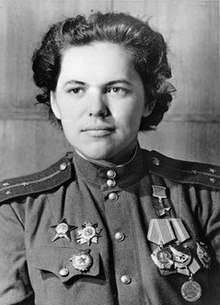Rufina Gasheva
Rufina Sergeyevna Gasheva (Russian: Руфина Сергеевна Гашева; 14 October 1921 – 1 May 2012) was a Soviet Polikarpov Po-2 navigator during World War II who served with the all-female 588th Night Bomber Regiment and recipient of the title of Hero of the Soviet Union. Postwar, she continued to serve and was a lecturer in foreign languages at the Malinovsky Military Armored Forces Academy before her retirement. After retiring, Gasheva worked in the Bureau of Foreign Military Literature at Voenizdat.
Rufina Sergeyevna Gasheva | |
|---|---|
 | |
| Native name | Руфина Сергеевна Гашева |
| Born | 14 October 1921 Verkhnechusovsky Gorodky, Permsky Uyezd, Perm Governorate, RSFSR |
| Died | 1 May 2012 (aged 90) Moscow, Russian Federation |
| Allegiance | |
| Service/ | |
| Years of service | 1941–56 |
| Rank | Lieutenant Colonel |
| Unit | 46th Guards Night Bomber Regiment |
| Battles/wars | World War II |
| Other work | Educator |
Early life
Gasheva was born on 14 October 1921 in the village of Verkhnechusovsky Gorodky in Permsky Uyezd, part of the Perm Governorate. She soon moved to the village of Vasilyevo, living there until 1927. Between 1927 and 1928 she lived in the village of Kasimovo in what is now Permsky District. Gasheva lived in Perm for the next two years, before moving to Moscow in 1930. In 1939 she graduated from high school, and by the summer of 1941 she completed two years at the Moscow State University of Mechanics and Mathematics.[1]
World War II
Gasheva volunteered for service in September 1941. She graduated from a navigators' course at the Engels Military Aviation School of Pilots in February 1942. Gasheva was posted to the all-female 588th Night Bomber Regiment of the Red Air Force, then forming in Engels. She fought in combat from May 1942, fighting in the Battle of the Caucasus. In February 1943 the regiment became the 46th Guards Bomber Aviation Regiment. Gasheva fought in the Air Battles in the Kuban, the Kerch–Eltigen Operation, the Crimean Offensive, the Mogilev Offensive, the Belostock Offensive, the Osovets Offensive, the Mlawa-Elbing Offensive, the East Pomeranian Offensive, and the Battle of Berlin. Gasheva's aircraft was shot down twice. On the first occasion, Gasheva and her pilot reached Soviet lines, but on the second they bailed over minefields and pilot Olga Sanfirova was killed when she stepped on an anti-personnel mine. During that incident, Gasheva landed on an anti-tank minefield several hundred meters to the South of Sanfirova;[2] after making it back to her regiment she began flying with Nadezhda Popova.[3] By the end of the war she flew 848 combat missions as a navigator of the Po-2 light bomber; after accumulating 823 sorties by December 1944 she was nominated for the title Hero of the Soviet Union, which she received on 23 February 1945.[4] Gasheva ended the war as a senior lieutenant.[5] She married bomber pilot Mikhail Pliats at the front.[6]
Postwar
Gasheva served with the regiment in the Northern Group of Forces until October 1945. Postwar, Gasheva and Pliats had a son, Vladimir, and a daughter, Marina. Pliats reached the rank of colonel.[7] In 1952 Gasheva graduated from the Military Institute of Foreign Languages, becoming a senior lecturer at the Foreign Languages Department of the Malinovsky Military Armored Forces Academy. She worked there until August 1957. She transferred to the reserve in December 1956 with the rank of major. From 1961, she worked as a senior editor in the Voenizdat Bureau of Foreign Military Literature, and between 1967 and 1972 she was a senior editor in the Office for Publication of Military Literature in Foreign Languages of the USSR Ministry of Defense. She lived in Moscow and was promoted to lieutenant colonel in 2000 before she passed away on 1 May 2012 and was buried in the Vostryakovsky Cemetery.[5]
Awards
- Hero of the Soviet Union (23 February 1945)
- Order of Lenin (23 February 1945)
- Two Orders of the Red Banner (25 October 1943 and 14 December 1944)
- Two Orders of the Patriotic War 1st class (26 April 1944 and 11 March 1985)
- Two Orders of the Red Star (30 November 1942 and 30 December 1956)
- Medal "For Battle Merit" (19 November 1951)
- campaign and jubilee medals
References
- Simonov, Andrey. "Гашева Руфина Сергеевна". warheroes.ru (in Russian). Retrieved 2019-01-29.
- Cottam 1998, p. 54.
- Rakobolskaya & Kravtsova 2005, p. 129.
- Cottam 1998, p. 32.
- Cottam 1998, p. 33.
- Braithwaite, Rodric (2010). Moscow 1941: A City & Its People at War. London: Profile Books. pp. 112–113, 348. ISBN 1847650627.
- Kravtsova, Natalya (1968). На горящем самолете [In a Burning Plane] (in Russian). Moscow: Moskovsky Rabochy. pp. 78–79.
Bibliography
- Cottam, Kazimiera (1998). Women in War and Resistance: Selected Biographies of Soviet Women Soldiers. Newburyport, MA: Focus Publishing/R. Pullins Co. ISBN 1585101605. OCLC 228063546.CS1 maint: ref=harv (link)
- Simonov, Andrey; Chudinova, Svetlana (2017). Женщины - Герои Советского Союза и России. Moscow: Russian Knights Foundation and Museum of Technology Vadim Zadorozhny. ISBN 9785990960701. OCLC 1019634607.CS1 maint: ref=harv (link)
- Rakobolskaya, Irina; Kravtsova, Natalya (2005). Нас называли ночными ведьмами: так воевал женский 46-й гвардейский полк ночных бомбардировщиков. Moscow: University of Moscow Press. ISBN 5211050088. OCLC 68044852.CS1 maint: ref=harv (link)
